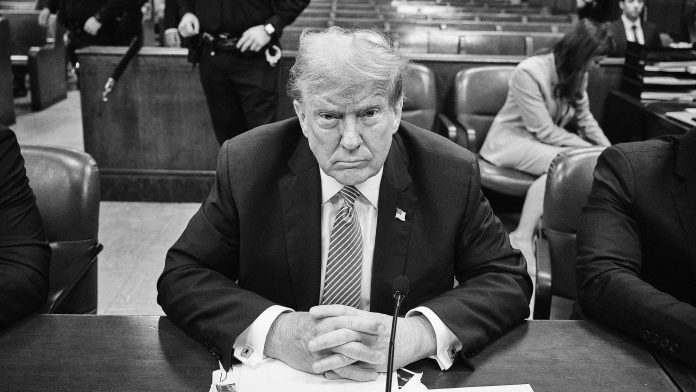Donald Trump’s biographers all seem to agree that he didn’t get a lot of love from his father. But what Fred Trump did impart to his son was an indelible lesson: There are two kinds of people in the world—killers and losers—and like his father, Donald had to be a killer.
In Fred Trump’s dark vision, all of life was a jungle in which the strong survive and prosper and the weak fall away. The killers take what they want, however they need to take it. Rules? Norms? Laws? Institutions? They’re for suckers. The only unpardonable sin in Trumpworld is the failure to act in your own self-interest.
The son learned these lessons well. He has charmed and conned, schemed and marauded his way through life on a scale his old man could hardly have imagined. From New York real estate to the White House, Trump has flagrantly breached the guardrails that contain most of us, and has largely been rewarded for it.
Until now. You could see that realization etched in the former president’s drawn and gloomy face captured in photos that emerged last week from Manhattan’s fabled Criminal Courts Building. You could sense it in his frenetic comments to reporters in the hallway outside Judge Juan Merchan’s courtroom, where Trump robotically recited the now-familiar word salad—“scam,” “witch hunt,” “hoax”—but did so with a trace of desperation, even fear.
Trump has defied seemingly career-ending controversies before, pulling off miraculous escapes. But these are more perilous straits. While he and his supporters dismiss the hush-money trial under way as a politically motivated sham, the potential consequences for the embattled former president are very real. And he seems to know it.
[George T. Conway III: The Trump trial’s extraordinary opening]
A conviction could carry jail time or, at the very least, chip away at his support in a precariously tight race with President Joe Biden. And defeat in the election would likely mean that the two pending federal trials Trump has so far managed to delay would move forward—one on charges of plotting to overturn the 2020 election; the other for allegedly snatching a trove of highly classified documents from the White House and obstructing repeated attempts by the government to retrieve them.
Those charges pose even greater risks to the former president’s reputation and freedom than Trump’s New York indictment for allegedly paying off a porn star to hide an affair from voters before the 2016 election and then burying the payment on his company’s books as normal legal expenses.
All of this appears to weigh on Trump as he sits in a courtroom for the first time as a criminal defendant, away from the campaign trail and cameras, in a setting and scenario he cannot control. A man who was bred to believe that the rules don’t apply to him—and who presents himself as peerless—is left to sit silently, by edict of the court, as a jury of his peers decides his fate.
All it would take, of course, is a decision by one of those jurors to spare Trump, and he, in his own, inimitable fashion, would brand a hung jury as complete vindication, using it to paint all the indictments against him as unfounded and political.
[Listen: The crucial factor of the Stormy Daniels case]
Trump would spin a potential conviction as well. He has already begun to do so: To Trump, the district attorney who brought the charges, Alvin Bragg— who is Black—is a craven politician, trying the former president on contrived charges for his own glory while he allows violent criminals to go free. Merchan, the judge—who is Hispanic—is biased and conflicted because he appears to have donated $15 to Joe Biden’s campaign in 2020, and his daughter is a Democratic consultant. Manhattan—and, by extension, the jury—is filled with Democrats and Trump-hating liberals. President Biden orchestrated the whole production.
If the jury returns a guilty verdict, we will hear it all.
Yet, as Trump sits and watches the criminal trial he hoped to avoid unfold, he must know that a potential reckoning he has spent a lifetime eluding could be coming. He has been reduced to a criminal defendant in a courtroom where someone else has absolute power and the rules very definitely apply. The weariness and vulnerability captured in those courtroom images betray a growing recognition that he could wind up as the thing his old man most reviled.
A convicted criminal?
No, worse. A loser.

















